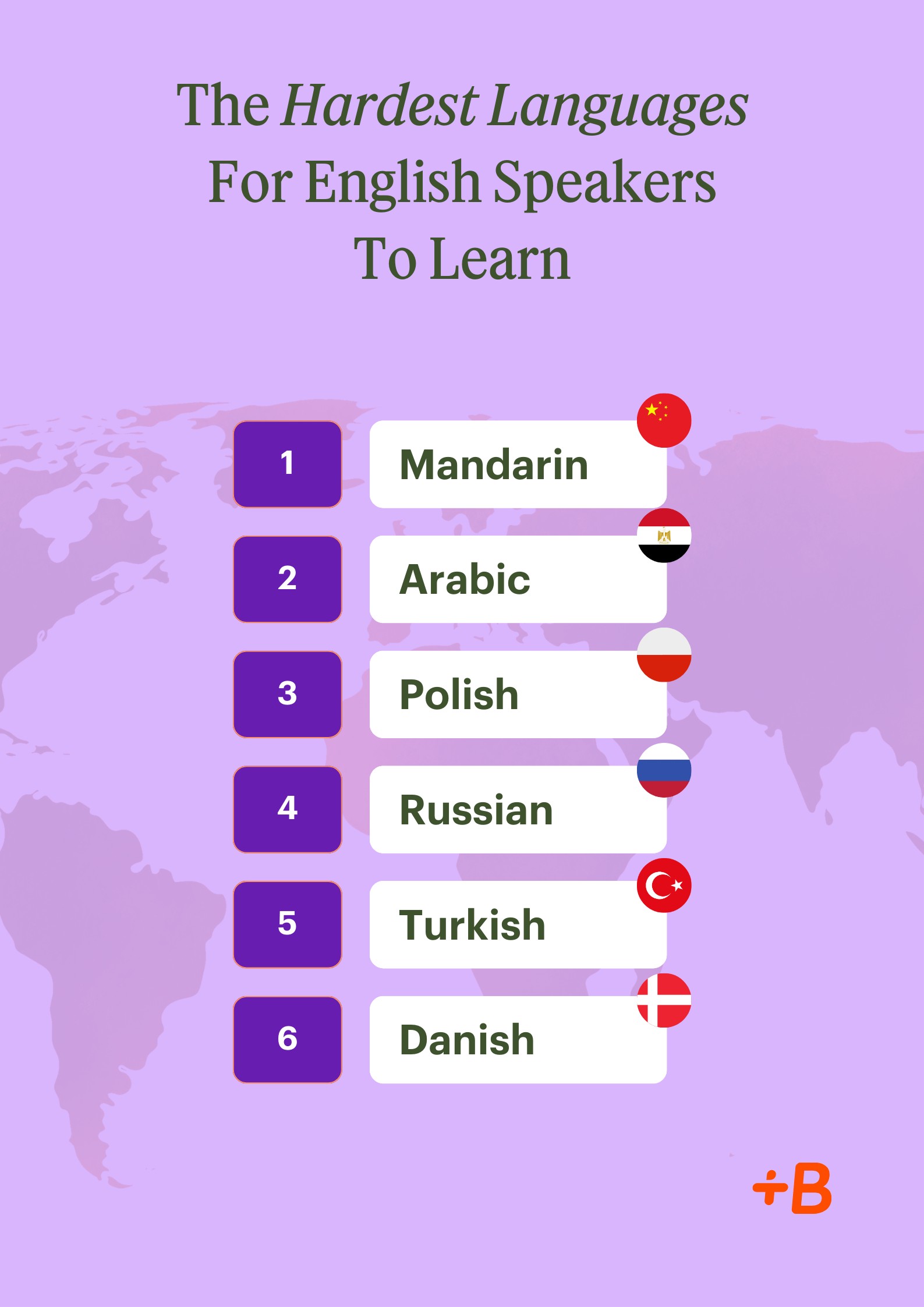Learning a new language is often touted as a rewarding challenge, opening doors to new cultures and ways of thinking. For English speakers venturing into this exciting endeavor, some languages present a steeper climb than others. While resources often highlight the easiest languages to pick up, what about those that truly test your linguistic mettle? Among these, Russian consistently ranks as a formidable yet fascinating language to conquer. You might be wondering, just How Hard Is Russian To Learn for someone who only speaks English?
 An infographic showing the six hardest languages to learn, with Russian in fourth place, highlighting challenges like Cyrillic alphabet, grammar cases, and pronunciation.
An infographic showing the six hardest languages to learn, with Russian in fourth place, highlighting challenges like Cyrillic alphabet, grammar cases, and pronunciation.
Based on linguistic analysis and the experiences of countless learners, Russian earns its place among the languages considered most challenging for native English speakers. This isn’t to say it’s insurmountable, but understanding the specific hurdles can help you prepare for the journey ahead. Let’s delve into the key aspects that contribute to Russian’s reputation as a difficult language to learn.
Deciphering the Cyrillic Script: A New Alphabet
One of the initial barriers for English speakers tackling Russian is the Cyrillic alphabet. Unlike languages like Spanish or French that use the familiar Latin script, Russian employs a writing system developed in the First Bulgarian Empire. At first glance, Cyrillic can seem intimidating with its set of characters that are both familiar and utterly foreign. You’ll encounter letters that look like Latin letters but sound completely different, and entirely new symbols that require memorization.
For example, the Cyrillic letter “В” looks like a “B” but is pronounced like a “V,” while “Р” appears to be a “P” but is actually an “R” sound. Then there are letters like “Ж,” “Щ,” and “Ы” which have no direct counterparts in the English alphabet and require learning new sounds and shapes. Mastering the Cyrillic alphabet is the first crucial step in learning Russian, as it unlocks the ability to read and write in the language. While it might seem daunting initially, consistent practice and resources designed for English speakers can make this hurdle manageable within a reasonable timeframe.
Navigating the Complexities of Russian Grammar: Cases and Conjugations
Beyond the alphabet, Russian grammar presents a significant challenge for English speakers, primarily due to its highly inflected nature. English grammar relies heavily on word order to convey meaning, while Russian utilizes a system of cases and verb conjugations.
Russian has six grammatical cases – Nominative, Genitive, Dative, Accusative, Instrumental, and Prepositional – each indicating a word’s function in a sentence. Nouns, pronouns, adjectives, and numerals change their endings depending on their case. This means you need to learn not just the base form of a word, but also its various case forms. For instance, the word “книга” (book) changes form depending on whether it’s the subject, object, or possessive in a sentence.
Verb conjugation in Russian is equally intricate. Verbs change endings based on person, number, tense, and gender in the past tense. While English has simplified verb conjugations over time, Russian retains a more complex system inherited from its Proto-Slavic roots. Understanding and correctly applying these grammatical rules is essential for forming grammatically correct and understandable sentences in Russian. This aspect of learning Russian often requires dedicated study and practice to internalize the patterns and exceptions.
Pronunciation Pitfalls: Sounds and Stress
Russian pronunciation presents another set of challenges. While some sounds are similar to English, others are completely new and require developing new muscle movements in your mouth and throat. Sounds like the trilled “р” and the various palatalized consonants can be tricky for English speakers to master.
Furthermore, Russian is a stress-timed language, meaning that stressed syllables are longer and louder, while unstressed syllables are reduced and often sound like the neutral vowel “uh.” The placement of stress in a Russian word is not always predictable from spelling and can drastically change the meaning of a word. For example, “замóк” (zámok) with stress on the second syllable means “lock,” while “зáмок” (zámok) with stress on the first syllable means “castle.” Accurate pronunciation, including stress placement, is crucial for being understood by native Russian speakers. Listening to native speakers, practicing pronunciation drills, and utilizing feedback from teachers or language partners are key to overcoming this challenge.
Vocabulary Acquisition: Familiar and Foreign Words
The Russian vocabulary presents a mixed bag for English speakers. While Russian is an Indo-European language and shares some cognates (words with shared origins) with English, particularly through Greek and Latin, the vast majority of vocabulary will be entirely new.
You might recognize words like “доктор” (doktor – doctor) or “информация” (informatsiya – information), but most everyday words like “здравствуйте” (zdravstvuyte – hello), “спасибо” (spasibo – thank you), or “вода” (voda – water) will be unfamiliar. Building a robust Russian vocabulary requires consistent effort in memorizing new words and phrases. Utilizing flashcards, spaced repetition systems, and immersing yourself in Russian content like books, movies, and music can significantly aid vocabulary acquisition.
How Does Russian Compare to Other “Hard” Languages?
When considering how hard is Russian to learn compared to other languages often cited as difficult for English speakers, like Mandarin Chinese or Arabic, it falls somewhere in the middle. Mandarin Chinese, with its tonal system and logographic writing system, presents unique challenges not found in Russian. Arabic, with its non-Latin script, right-to-left writing direction, and complex consonantal root system, also poses distinct hurdles.
Compared to these, Russian’s Cyrillic alphabet, while new, is phonetic and can be learned relatively quickly. Russian grammar, while complex, is arguably more systematic than English grammar in some aspects. Pronunciation, while challenging, may be less daunting than mastering the tones in Mandarin. Ultimately, the perceived difficulty of a language is subjective and depends on individual learning styles and prior linguistic experience.
Is the Challenge of Learning Russian Worth It?
Despite the challenges, learning Russian offers immense rewards. Russian is a globally significant language spoken by over 150 million people worldwide. It’s the language of a rich culture with a vast literary tradition, world-renowned classical music, and a fascinating history.
From a practical standpoint, Russian proficiency can open doors to career opportunities in fields like international relations, translation, education, and business, particularly in regions with Russian-speaking populations. Moreover, tackling the challenge of learning Russian can be a deeply rewarding personal achievement, boosting cognitive skills and expanding your understanding of language and culture in general.
Conclusion: Embracing the Russian Language Journey
So, how hard is Russian to learn? It is undeniably a challenging language for English speakers, demanding dedication, perseverance, and a willingness to grapple with new linguistic concepts. However, with the right approach, resources, and motivation, the difficulties of learning Russian can be overcome. Embrace the challenge, celebrate the small victories, and you might find yourself captivated by the beauty and richness of the Russian language. The journey may be demanding, but the destination – fluency in Russian – is well worth the effort.
